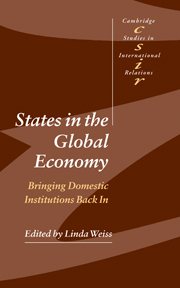Book contents
- Frontmatter
- Contents
- List of figures
- List of tables
- List of contributors
- Preface
- 1 Introduction: bringing domestic institutions back in
- Part I The resilience of welfare states
- Part II New economic challenges, changing state capacities
- Part III Governing globalisation
- 11 Managing openness in India: the social construction of a globalist narrative
- 12 Guiding globalisation in East Asia: new roles for old developmental states
- 13 Governing global finance: financial derivatives, liberal states, and transformative capacity
- 14 Is the state being ‘transformed’ by globalisation?
- List of references
- Index
- CAMBRIDGE STUDIES IN INTERNATIONAL RELATIONS
12 - Guiding globalisation in East Asia: new roles for old developmental states
Published online by Cambridge University Press: 22 September 2009
- Frontmatter
- Contents
- List of figures
- List of tables
- List of contributors
- Preface
- 1 Introduction: bringing domestic institutions back in
- Part I The resilience of welfare states
- Part II New economic challenges, changing state capacities
- Part III Governing globalisation
- 11 Managing openness in India: the social construction of a globalist narrative
- 12 Guiding globalisation in East Asia: new roles for old developmental states
- 13 Governing global finance: financial derivatives, liberal states, and transformative capacity
- 14 Is the state being ‘transformed’ by globalisation?
- List of references
- Index
- CAMBRIDGE STUDIES IN INTERNATIONAL RELATIONS
Summary
According to the new mantra of globalisation analysis, states are not ‘disappearing’ or ‘declining’ in importance. They are being ‘transformed’. Since states are increasingly pressured from below by capital mobility and from above by supranational forms of governance such as the WTO, their traditional hold over economic actors has diminished, their control of the domestic economy has eroded, and their room for manoeuvre in the policy arena has been reduced to the margins. While meant to apply more generally, this view has become increasingly influential in the literature on East Asia's developmental states (DS). It is now widely anticipated that whatever remained of developmental states in the region before the financial turmoil of 1997, the pressures of financial liberalisation as well as the market-opening measures being imposed by the WTO agreements and IMF conditionalities have squeezed out developmental ambitions and eliminated the scope for coordinating economic outcomes in the domestic arena.
This claim is examined in the light of the Korean and Taiwanese experiences. As capitalist developmental states with Japan-style institutions, they are seen to be the most deviant, within the region, from the free-market model and it is the forced retreat of such developmental states from economic governance that now defines the standard view inside and outside the academy. We must ask therefore in what significant ways are developmental states affected by increasing exposure to global markets, and in what respects is state transformation real?
- Type
- Chapter
- Information
- States in the Global EconomyBringing Domestic Institutions Back In, pp. 245 - 270Publisher: Cambridge University PressPrint publication year: 2003
- 49
- Cited by

